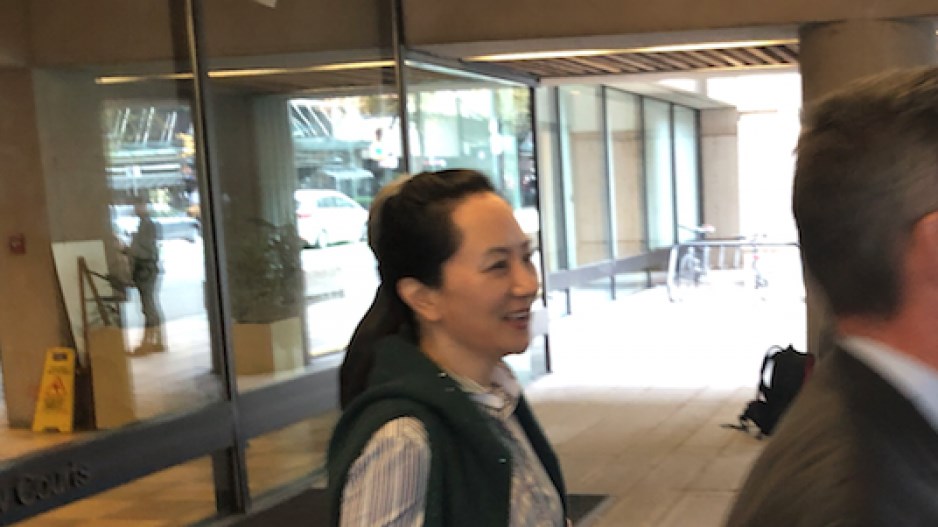The retired senior Canadian border services official who allegedly told her staff not to keep notes on the Meng Wanzhou extradition case - in order to avoid having to disclose the information in court - denied those allegations Friday.
When questioned in court, Roslyn MacVicar – the former director-general for the Pacific region for the Canada Border Services Agency – said a statement telling her staff not to keep notes is something she “would never say.”
The allegations come after a previous witness, CBSA’s passenger operations chief at YVR Nicole Goodman, told the court that MacVicar asked her to “start gathering but don’t create” in the days after Meng’s arrest at Vancouver International Airport on Dec. 1, 2018.
Mona Duckett, defence lawyer for the Huawei Technologies Co. Ltd. CFO, then squarely accused MacVicar of trying to conceal the facts surrounding the circumstances of Meng’s arrest by the RCMP after three hours of CBSA border inspections – a procedure that included the border agency obtaining Meng’s cell phones and passcodes without her knowing she was being arrested.
“I suggest you did direct your staff to not create because [the created notes] would be disclosable,” Duckett said.
“It’s not something I would say,” MacVicar responded. “... It’s not consistent with what I would say. My only concern would have been to express concerns about operational staff being asked information [about extradition], because they don’t have an understanding of what happens. It is the Department of Justice’s jurisdiction to comment on that.”
“Giving the RCMP Ms. Meng’s passcodes is not an extradition matter,” Duckett fired back. “It’s a matter of the CBSA committing a privacy breach... Not documenting that mistake is hardly transparent. It’s trying to hide the facts that the passcodes were given.”
Earlier in the day, Duckett completed her cross-examination of Goodman, the case’s ninth witness.
Goodman concurred when Duckett asked if she agreed with a statement made in court by subordinate officer Sowmith Katragadda previously, stating that he was discouraged from taking notes of Meng’s border inspection on Dec. 1, 2018 since it could be sought in a subsequent legal dispute.
Goodman also said in court that she was told similar things from CBSA superiors, which prevented her from having notes that may recall more fully what happened on the day of Meng’s arrest. But she maintained that those directions did not affect the way Meng was examined for three hours before being released into RCMP custody.
“Hindsight is 20-20,” Goodman told the court. “At the time, it was a routine procedure because we had thousands of people coming into the airport at any given time. So do I wish I have the notes today? Absolutely. But at the time, it never crossed my mind.”
Duckett also proposed that – in comparing the testimony of the RCMP and Goodman – that the police were trying to “recast true facts” of the arrest by downplaying its role, emphasizing that the RCMP not being seen as a leader in the arrest process as well as de-emphasizing the information being shared from the CBSA. Goodman replied that she did not recast anything, although she cannot speak for the RCMP.
Goodman admitted under questioning that she does believe some information on the Meng case was shared inappropriately outside of the CBSA (such as the Huawei executive’s passcodes, which was passed over to the RCMP). But Goodman also pushed back on Duckett’s proposition that the CBSA border exam was a guise to secure Meng’s phone and passwords without having her being arrested and therefore aware of her charter rights.
“Would you agree that nothing was gained to support Ms. Meng’s inadmissibility question [during her CBSA examination]?” Duckett asked.
“I would disagree with that,” Goodman replied. “My experience with the examination process for national security concerns is that it’s very broad in scope... Things like employment, travel history and residence are all important information to have in order to further the investigation.”
“How does Ms. Meng owning homes all over the world point to any national security concerns with regards to espionage?” Duckett fired back.
“Without the RCMP arrest process, the border examination may have taken days,” Goodman replied. “The examination was adjourned because there was a criminal process... once that’s completed, the CBSA may choose to resume the admissibility examination at that time.”
The hearings continue on Monday.




